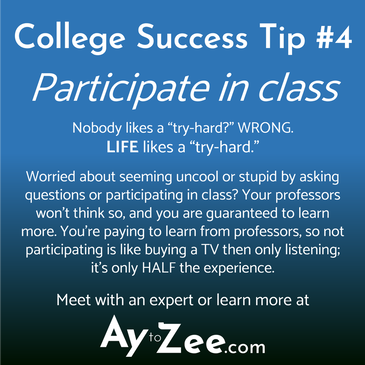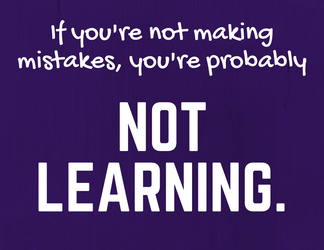 "How's school/college going?" "It's good I guess, it's more difficult than I thought it would be." "Are you participating in class?" "Well no." "Why not?" "It's awkward. I don't want to look stupid, there are upperclassmen in class, and I don't want to be 'that guy' who tries too hard or makes class take longer." I've had this conversation in one form or another so often over the past few years with high school and college students alike. In order to fix this we need to answer one primary question: What is the purpose of school? If the purpose of school is to protect one's image or look "cool," then maybe you should consider not speaking up in class or perhaps consider the people you're trying to impress; if they don't think participating in class is cool, then those people aren't worth knowing anyway. Plus some of the most participatory kids ARE the "popular" kids. However, if the purpose of school is to learn material and skills and improve yourself, participating in class is a no-brainer. If you DON'T participate in class, then sitting through a lesson is no different than watching a YouTube video. If students don't participate in class, then the teacher asking questions is no different than the Blues Clues/kids show pause after asking a question. You don't get to be corrected and explain WHY you were wrong. If you're in college and you don't participate, you're essentially paying as much as $75,000/year for a TV you're going to watch on mute, or listen to at full volume and face the wall instead. If you don't ask questions, provide answers (even/especially if they're wrong), get to know your professor, etc. you're paying to watch a YouTube video (and sometimes a bad one at that), live in a crappy hotel, eat (usually) not so great food, and drink/party. *Cue sarcasm* That doesn't seem like a waste of money at all... *End sarcasm*  How do you participate in class? Asking questions is just one way to take advantage of a teacher's knowledge, understanding, and (usually) their ability to provide multiple examples/break down a topic further if students don't understand. But you need to ask questions, otherwise the teacher won't know you DON'T know something UNLESS YOU PARTICIPATE. When a teacher asks a question, answer it! One of two things will happen: you'll be right, or you'll be wrong. If you're right, saying the right answer will help you remember it later on and you'll help move the class along (teachers appreciate that a lot). If you're wrong, then you'll learn where you went wrong and show your teacher that you're engaged. It'll correct a misconception you had and it may also answer a question that someone ELSE had. In school as in life, failure is ALWAYS an option, and if you're not making mistakes you're probably not learning. If you don't feel comfortable making mistakes, it's a good thing to get over that in high school when the stakes are virtually zero. For Distance Learning Students:It is more important than ever to participate in virtual school for a multitude of reasons.
0 Comments
|
AuthorsOur coaches are working hard gaining experience and putting together resources to help YOU!
NOTE: All of our College Success tips work for ANY level of school!
Archives
July 2024
Categories
All
|

 RSS Feed
RSS Feed